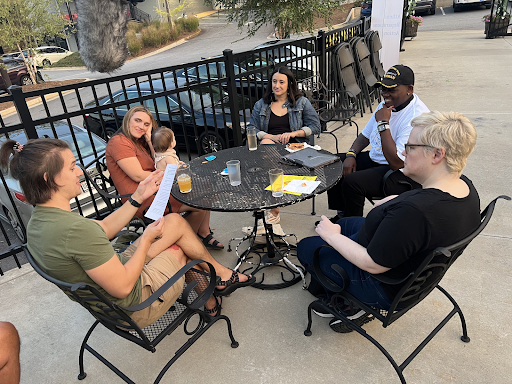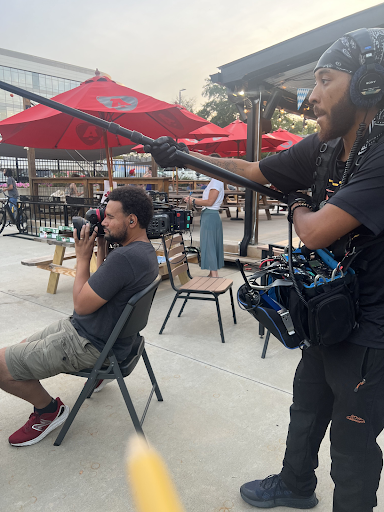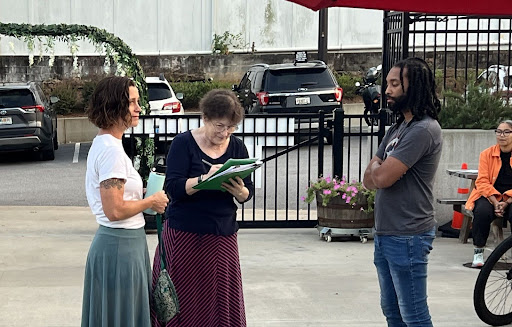The nonprofit organization Athens Reparations Action was created in August 2022 in order to bring recognition and awareness to what they see as racist policies used to hurt African Americans at the time, such as the Linnentown incident in Athens.
“We currently have $45,000 in the bank,” said Co-President Alys Willman, which is still quite a bit away from their $110,000 goal. Willman wasn’t worried however, as she said their organization also has more than 10 pledges from those who intend to pay at a later date. People can sign to give donations at their meetings or on their website.
Linnentown was chosen to be the first target of the organization because while the same thing happened in neighborhoods across the United States, according to the ARA’s website, Linnentown is considered one of the most documented cases.
Currently, the organization intends to raise money to pay back first descendants of Linnentown in the form of reparations. Specifically, they aim to repay all 11 living descendants $10,000 each with money raised from fundraising.


place at the event. (Photo/Campbell LaRocco)
What are Reparations?
Reparations are a topic that have come up in debate more often in recent years as politics have become rather polarizing, but what exactly are these reparations?
In politics, reparations are payments made by citizens to those who come from a line of people who have faced human rights violations against them because of their race from early America to now.
According to the Merriam-Webster Dictionary, reparations are “the payment of damages.”
What was Linnentown?
Linnentown used to be a thriving African-American neighborhood in Athens that held around 50 separate low-income families. During the 50s and 60s, however, many states started urban renewal programs to clear any “blighted” areas that were seen as unappealing. These areas were mostly inhabited by minorities or low-income families.
In 1962, the city of Athens and the University of Georgia used the power of eminent domain to forcibly take this land for its own use, removing those families that had been previously living there, as the University was growing in student size and needed more housing. Once the people living in the area were gone, the buildings were destroyed and replaced with the dormitories Creswell Hall, Brumby Hall and Russell Hall.
This decision displaced several African Americans from their homes and has since been deemed as unfair.
Since this decision, the current mayor of Athens, Kelly Girtz, has apologized on behalf of the city for the incident, while the University of Georgia does not feel there is a reason to apologize.
Girtz also made the decision with the help of the city’s board of commissioners to go beyond an apology and bring recognition to the event. On Sept. 21, a section of South Finley Street between Baxter Street and Cloverhurst Avenue was renamed Linnentown Lane to remember and honor those who were displaced from their homes.
The Nuance of Reparations
Unfortunately, in recent years, the politics in America have grown more divisive than ever before, making it hard to come together and talk about social issues such as reparations. Grady Newsource reporters attempted to send out surveys on reparations and little to no responses were received.
One person, who wishes to remain anonymous, even went as far as to say, “I’m gonna get canceled if I answer that.”
Of the few responses received, almost all of them were in the age range of 16-25 with only one response coming from someone in the range of 26-32.
Reparations Going Forward
Linnentown was not the only incident in which people are wanting reparations. The biggest push for reparations is for those who are descendants of former slaves in America. An example of this is the California Reparations Report, which was created by Gov. Gavin Newsom’s task force.
The report itself suggests having the state pay these reparations to descendants of slaves using taxpayer dollars, which will likely reach up to millions based on their suggestions. The document, which consists of 40 chapters and over 1,000 pages, has been given to California lawmakers and is currently being deliberated upon as to whether or not any of the recommendations will be signed into law.
Due to California’s progressive nature, states across the country are watching as the decisions that come from this bill could potentially lead to other states paying reparations to descendants of families with similar experiences to those of Linnentown.
Campbell LaRocco is a senior majoring in journalism at the University of Georgia.








Show Comments (2)
Alys Willman
On behalf of Athens Reparations Action, we really appreciate this article! One point of clarification: there were 11 original Black homeowner families (not individuals) displaced from Linnentown. The money ARA is raising will be allocated to the descendants of those 11 families. And we are happy to report that we have now raised $70,000 toward our goal. All the best and thank you!